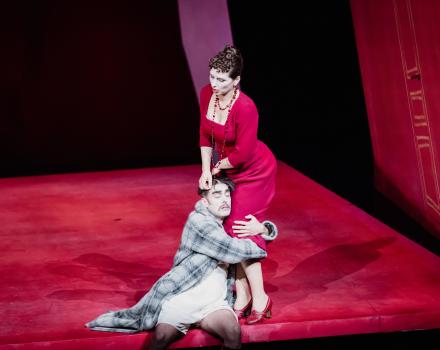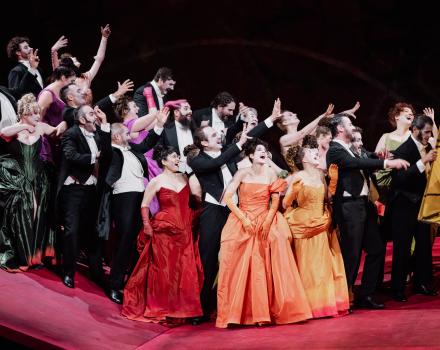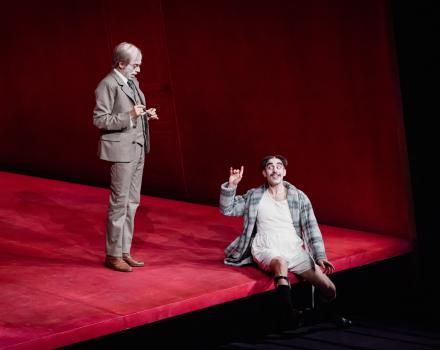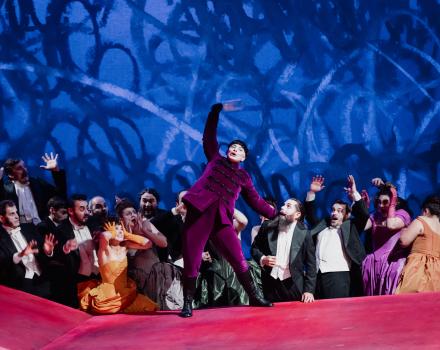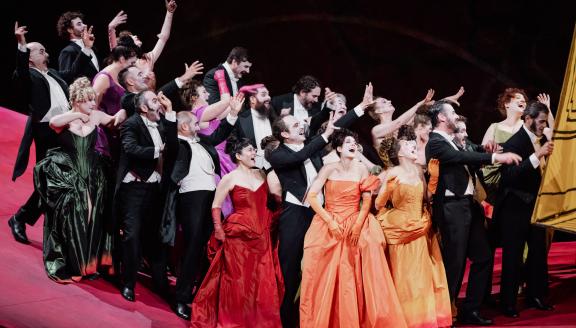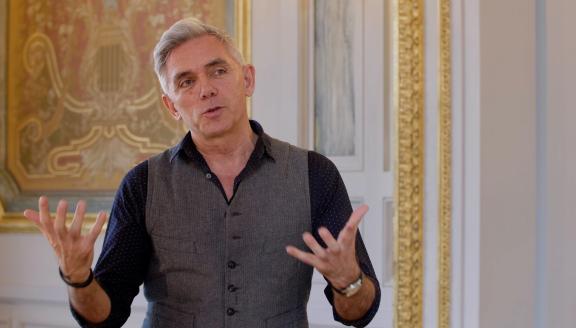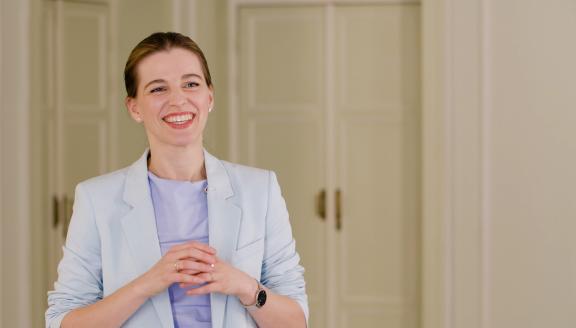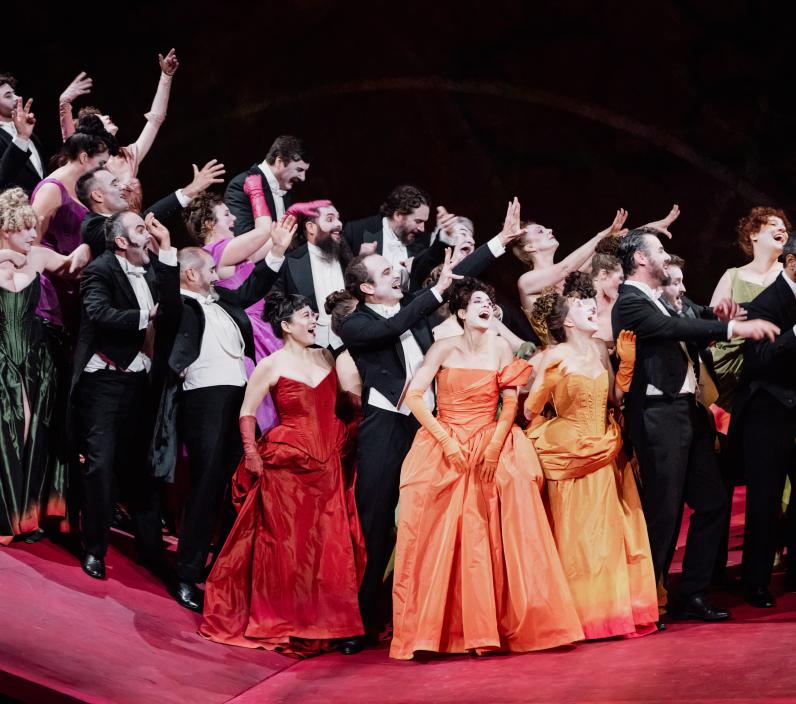
The most brilliant of Austrian operettas takes us to the outskirts of romantic Old Vienna. It’s New Year Eve and we are in the company of Caroline, who is determined to teach her philandering husband Gaillardin a lesson, even while she is being pursued by her former beau, the operatic tenor Alfred. At the centre of the action is the extremely wealthy, eternally bored Prince Orlofsky, whose lavish masked ball brings everything to a most delicious boil. But what if the whole plot has been a cunning plan masterminded by someone just to get back at Gaillardin?
Die Fledermaus, Johann Strauss II’s comic operetta in three acts which premiered in 1874, has become a synonym of the operetta genre. In only six years, the operetta was staged in more than 170 theatres in the German-speaking regions and, by the 1890s, was performed all over the world. The libretto was written by Richard Genée and Karl Haffner after the burlesque The Prison by Julius Roderich Benedix and vaudeville piece Le Révellion by Henri Meilhac and Ludovic Halévy. The emblem of Viennese refinement, here the new production from Opéra de Lille returns Die Fledermaus to these origines with song and dialogue in French. The staging is entrusted to the colourful imagination of Laurent Pelly. A master of comedy – as seen in his recent Meistersinger from Madrid – Pelly is able to indulge his taste for zany situations with precision, elegance and charm. This is sparkling Chauve-Souris turned on its head... which, as it were, is the Bat’s most natural position.
CAST
|
Gaillardin
|
Guillaume Andrieux
|
|---|---|
|
Caroline
|
Camille Schnoor
|
|
Adele
|
Marie-Eve Munger
|
|
Duparquet
|
Christophe Gay
|
|
Bidard
|
Raphaël Brémard
|
|
Tourillon
|
Franck Leguérinel
|
|
Prince Orlofsky
|
Héloïse Mas
|
|
Alfred
|
Julien Dran
|
|
Léopold
|
Eddy Letexier
|
|
Ida
|
Claire Antoine
|
|
Extras
|
Camerone Bida
Éloïse Rose
|
|
Orchestra
|
Orchestre de Picardie
|
|
Chorus
|
Opéra de Lille Chorus
|
| ... | |
|
Music
|
Johann Strauss II
|
|---|---|
|
Text
|
Karl Haffner
Richard Genée
|
|
Conductor
|
Johanna Malangré
|
|
Director
|
Laurent Pelly
|
|
Adaptation of the libretto and dialogue
|
Agathe Mélinand
|
|
French adaptation of the lyrics
|
Moshe Leiser
Patrice Caurier
|
|
Scenography
|
Chantal Thomas
|
|
Lights
|
Michel Le Borgne
|
|
Costumes
|
Laurent Pelly
Elsa Bourdin
|
|
Assistant director
|
Paul Higgins
|
|
Vocal coaches
|
Christophe Manien
Flore Merlin
|
|
Chorus master
|
Mathieu Romano
Louis Gal
|
| ... | |
VIDEOS
Story
Act I
The chambermaid Adèle is invited (or so she believes) by her sister Ida to attend a ball given by Prince Orlofsky. After some difficulty she succeeds in getting the night off by inventing a moving story about a sick aunt. Meanwhile her employer, Gaillardin, a man of independent means, has recently been given a prison sentence for insulting a public official. But rather than reporting to serve the sentence, he is persuaded by his friend Duparquet to join him for a night of revelry at Orlofsky’s. Duparquet is following his own agenda – Gaillardin once humiliated him in front of the whole town by leaving him to return home from a masked ball through the streets, drunk and dressed as a bat, and Duparquet now sees his opportunity for revenge; and so he also invites Gaillardin's wife Caroline to the ball. Due to Gaillardin’s departure ‘for prison’, Caroline is already in disarray when a former admirer of hers named Alfred shows up and tries to woo her, only to be arrested by prison governor Tourillon who takes him for Gaillardin. Tourillon, satisfied by a job well done, then also decides to attend Orlofsky's ball.
Act II
At the ball, Duparquet machinations play out splendidly: to Gaillardin’s astonishment he meets his chambermaid Adèle, who brazenly denies her identity; he befriends a French ‘chevalier’ – in truth none other than prison governor Tourillon; and finally he falls in love with his own wife, masked and disguised as a Hungarian countess.
Act III
The knots begin to unravel. The action takes place at the prison, a rather shady affair thanks to Léopold, the permanently drunk gaoler. One by one, the characters reappear: first prison governor Tourillon, extremely hungover, then Adèle, who is hoping to find a patron to foster her dramatic talent, along with her sister Ida, and then Gaillardin, who is astonished to find that he has apparently been locked up all night. When Caroline also appears and, together with Alfred, demands an interview with a lawyer, Gaillardin dons a disguise and takes the place of the stuttering lawyer Bidard. This trick allows him to get to the bottom of the previous evening’s events. Fortunately, he then allows himself to be convinced that everything was a part of Duparquet’s plot for revenge; and so it all ends happily, and Adèle even finds her patron in the form of Prince Orlofsky.
GALLERY
